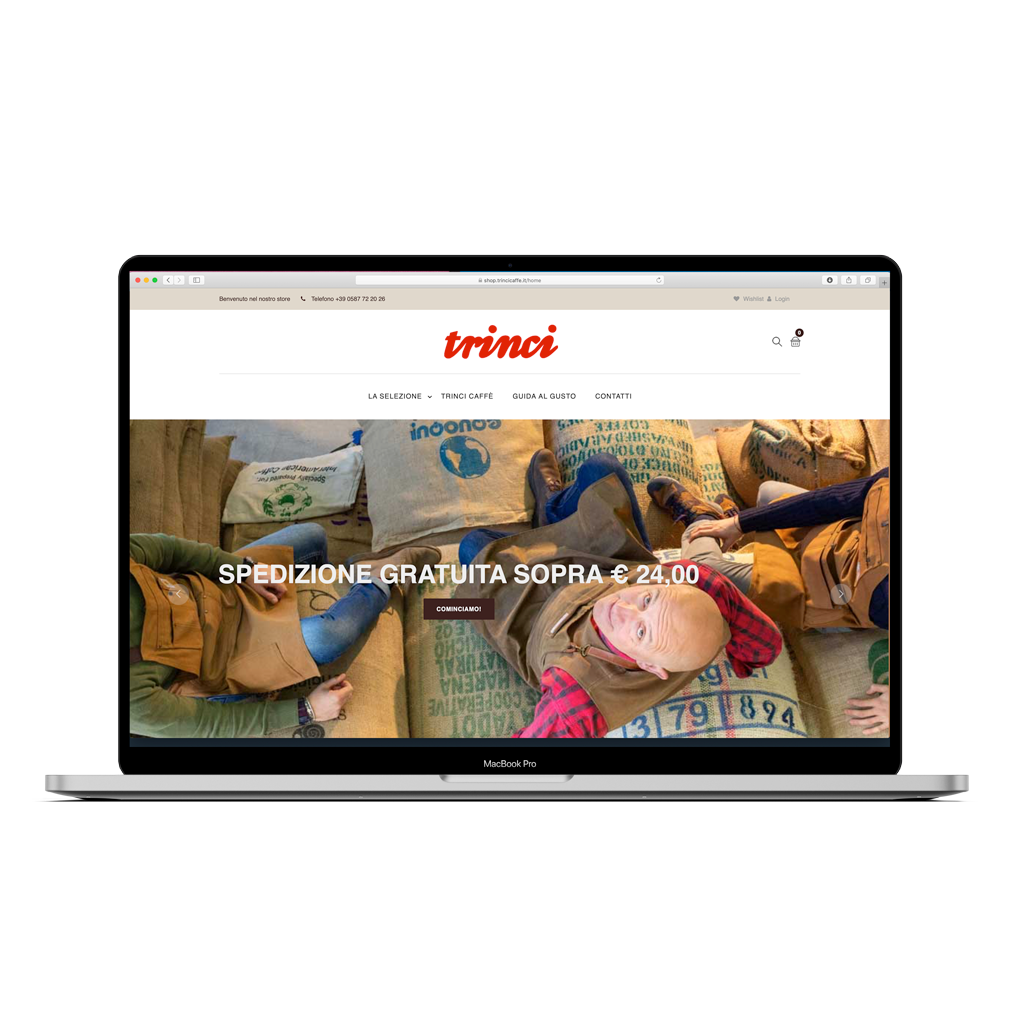E-commerce
Nowadays, selling online is a requirement that few companies can avoid. We design and develop integrated and multichannel e-commerce solutions to enable companies of all sizes to leverage the potential offered by internet sales.
Online sales, an indespensable channel.
The magnitude of e-commerce in Italy has a lower turnover than the UK and Germany, compared to a similar overall market: the growth margin is still very high. Now more than ever, launching an e-commerce website represents a great opportunity for many companies.At ELbuild, we have been creating e-commerce systems since 2006. We've successfully managed the opening of online stores in the most varied product sectors, including luxury, food, electronics, clothing, publishing and plant nurseries.
The development of an e-commerce system is a complex process that begins with the analysis of the product catalogue and the sales procedures, as well as identifying the systems involved in the entire order management. We support customers in this process and are able to determine the best possible solution according to the operational context, be it the development of an e-commerce website based on Magento or a completely customised and tailor-made solution.
A tailor-made e-commerce solution may be preferred due to the complex type of products in the catalogue, the sales process or specific requirements for the interface, including pre-existing management systems or particular payment gateways. We'll advise you and identify the ideal solution together.

Fully customised e-commerce solutions.
The future (and the present) of multichannel e-commerce consists of modular solutions, with business logic segmented into microservices accessible via APIs and a light and responsive frontend developed with client-side technologies.If a CMS like Magento or Woocommerce won't suffice, or you're simply seeking a completely flexible solution that is open to future variations of any scale, we offer our customers a completely customised solution created using a business logic accessible via REST APIs and a frontend in Angular or Vue.js. A customised platform enables us to satisfy the most stringent requirements in terms of sales workflow and to offer clients a user experience that is more aligned with their corporate image and values. Our extensive e-commerce development experience allows us to develop the basic components quickly and to lay a solid foundation on which to structure the rest of the web application.
A completely ad-hoc solution allows you to manage URLs and meta attributes in complete harmony with the overall SEO strategies already in place, also from the perspective of web marketing. In contrast, a solution based on Magento may prove to be less flexible in this regard.
Often, the longer time-to-market of this type of solution is offset by a higher conversion rate, deriving from the potential freedom to define every single aspect of the shopping experience.
Why don't we use Magento and Woocommerce any more?
From roughly 2010 to 2016, most of the e-commerce systems we developed were based on Magento. Nowadays, although we're still quite knowledgeable about the platform, we don't recommend its use and prefer different solutions.Technical and strategic reasons led us to make this decision. From a technical perspective, despite recent attempts to evolve the basic stack (e.g., Magento PWA), all traditional CMSs are solutions that rely on the server-side generation of the page and its manipulation through primitive tools, such as jQuery or other JS frameworks. This translates into greater demand for server-side hardware, an intrinsic delay, and an often degraded user experience compared to headless solutions that leverage a set of REST APIs for business logic and integrate an Angular, Vue.js or React frontend.
In contrast, from a strategic point of view, CMS-based solutions turn out to be less flexible and more expensive to maintain over time, forcing greater compromises due above all to the obsolescence of third-party plugins, as well as by a certain inertia within the community that follows open source development.
Integrations with third-party systems
In most cases, an e-commerce system is only functional if it's integrated within the existing sales processes.At ELbuild, we're able to develop integration modules with the most popular management systems, also by developing custom software capable of exposing software interfaces of any type, REST API and SOAP, XML RPC, and up to a simple exchange of files via FTP.
From the perspective of integration, we're able to implement state-of-the-art analyses and reporting platforms in the e-commerce systems we develop. Payment gateways
also play an important role in the development of an online sales system..We can help you to select the best gateway according to the context in which your e-commerce system operates. Over the years, we've integrated the following payment gateways into different systems, such as Stripe, Paypal, Braintree, Paythru, Nexi, SIA-SSB, KeyClient and BNL.
Moreover, over the last two years, the growing trend of buying from mobile devices has made it necessary to create a pleasant shopping experience, even while on the move and on small screens. For this purpose, we can develop responsive themes for our e-commerce systems or rethink the entire purchasing process through a hybrid or native app.

Strategic consulting for online sales
The development of an e-commerce website is only the first, and often simpler, step in the process that leads a company to create a successful online shop.Publishing an e-commerce website won't suffice to create online sales, regardless of the technology with which it is created. The determining factors for success are many, including the type of product, pricing, placement in comparison to competitors and the promotion strategies implemented. Even before creating your e-commerce system, ELbuild takes care of evaluating the best overall strategy with you and globally assessing the feasibility of the project and the probabilities of a successful investment.
Rather than receiving a commission, we prefer to develop a product that we consider strategically weak from the start because our success is closely linked to that of our client.
Contact us for a no-obligation chat. We won't try to sell you an e-commerce solution, and we won't offer you one unless we believe the initiative will benefit your business.
Discover just some of the online shops we've developed:

We created an online shop to sell coffee based on REST APIs for Trinci.
Learn more
We created an online shop for Network21 to sell physical and virtual products.
Learn more
With the Vitamina project, we assisted a startup in creating an e-commerce system for the sale of dietary supplements
Learn more
 richieste@elbuild.it
richieste@elbuild.it  Elbuild s.r.l.
Elbuild s.r.l.